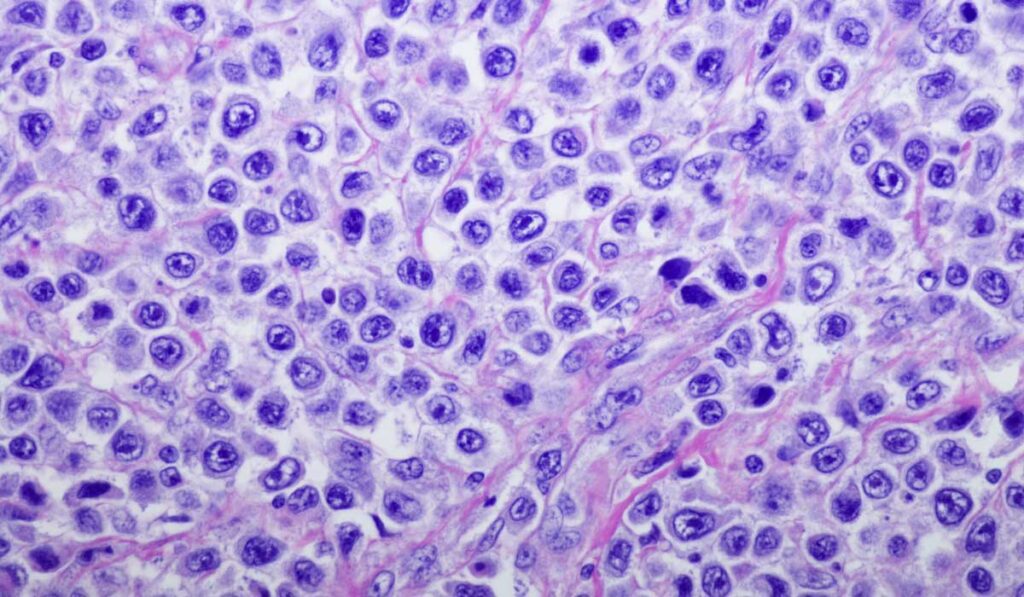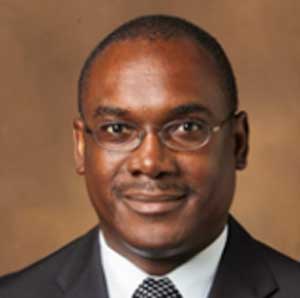FDA approved in 2018, chimeric antigen receptor (CAR) T-cell therapy has pushed durable remission rates for adult patients with refractory large B-cell lymphoma from 26 percent to 82 percent. Yet adverse side effects of cytokine storms and neurological morbidity still limit the potential for optimal outcomes, raising hospital length of stay, lowering tolerance for future therapy, and contributing to long-term disability.
Olalekan Oluwole, M.D., assistant professor of medicine at Vanderbilt University Medical Center, is first author on a new study in the British Journal of Haematology from the ZUMA-1 trial, reporting how prophylactic corticosteroid treatment may help lower adverse events from axicabtagene ciloleucel (axi-cel), a potentially curative CAR T-cell therapy for large B-cell lymphoma. “The question I explored was how to use steroids in a prophylactic manner. Can we apply an ounce of prevention and get a pound of cure?” Oluwole asked.
Oluwole and his research colleagues found substantial benefits in heading off high-grade adverse events. “The study indicates that by adding a small dose of steroid preventatively, we may avoid the larger risks of the adverse events as well as problems associated with more intense corticosteroid treatment to counter these events,” he said.
Risks of CAR T-cell Therapy
Historically, the standard of care for relapsed large cell lymphoma was more chemotherapy followed by autologous or allogeneic stem cell transplant. Now, CAR-T cell therapy is the standard. “The CAR T-cell process harnesses the properties of the immune system and redirects them to target the cancer,” Oluwole said. “It works differently from chemotherapy in that it is given once and can keep going until every last one of the bad cells is destroyed.”
As this supercharged immune system goes after the cancer cells, risks of significant side effects rise. In large B-cell lymphoma, high grade or severe cytokine release syndrome and neurological events occur in 13 and 28 percent of cases, respectively. The cytokine storm happens shortly after the cells are infused. It causes significant inflammation, which can lead to other serious complications. “Patients may need to be moved into intensive care,” Oluwole said. “The neurological events can render patients unresponsive for hours or days.”
Typically, patients are given high doses of corticosteroids for prolonged periods to calm down the CAR T-cells and the immune system. While effective, this treatment carries risks and delivers a secondary blow by compromising the impact of the CAR T-cell therapy. Oluwole says monoclonal antibodies may help blunt the cytokine storm, but much of the time, corticosteroids are also needed.
Prophylaxis Enhances Safety
Oluwole and his team hypothesized that a very modest steroid regimen could prevent these adverse events. To test this, they enrolled 42 patients from 18 sites into a study arm where patients received 10 milligrams of dexamethasone just prior to receiving CAR T-cell therapy and on the following two days. They compared the result with a previous arm of the ZUMA-1 trial.
In the study arm, the rate of cytokine storm following therapy was zero versus 13 percent in the control arm. High-grade neurological events were 13 percent versus 28 percent, respectively. “We also found that in those who did have a neurological event, the time between treatment and when they developed toxicities was actually pushed out,” Oluwole said. “This can have implications in deciding between outpatient versus inpatient treatment.”
Importantly, corticosteroid prophylaxis and early intervention did not appear to compromise axi-cel efficacy. Study authors intend to follow up with a larger cohort of patients to confirm these findings.
Confirmational Study Ahead
The study may be particularly relevant to patients over 70 and to those who are frail. Often, such individuals are not candidates for autologous stem cell transplant and are also likely to suffer more adverse events from CAR T-cell therapy. “For many of these patients, using prophylactic steroids may offer a way to get them through CAR T-cell therapy,” Oluwole said.
Oluwole and colleagues are in discussions about a larger study. “We need outcomes from more patients before I think this protocol will be broadly extended to everyone, including younger patients. In the meantime, individual institutions may adopt it as they see fit,” he said. “At Vanderbilt, we now use it regardless of age and frailty – just as we did in the study.”





